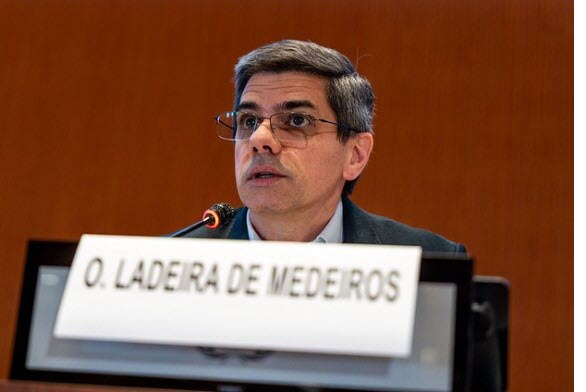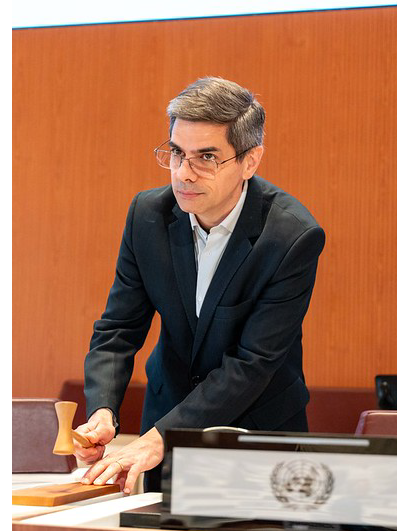Version française - Versión española
 Otavio Ladeira Medeiros, the new Chief of the DMFAS Programme, brings decades of experience in debt management from his long career at the Brazilian Treasury. In this interview, he shares insights from his professional path, his vision for DMFAS, and the challenges developing countries face today.
Otavio Ladeira Medeiros, the new Chief of the DMFAS Programme, brings decades of experience in debt management from his long career at the Brazilian Treasury. In this interview, he shares insights from his professional path, his vision for DMFAS, and the challenges developing countries face today.
Conducted by: Alicia Zamboni, Geneva, April 2025
Alicia: You have a distinguished and long career in public debt management, with a significant time of it spent in key positions within the Brazilian government. Your experience spans debt management, fiscal policy, and various leadership roles. Could you tell us about your professional journey and what led you from the Brazilian government to UNCTAD? What inspired you to pursue a career in international affairs ?
Otavio: I spent my entire professional life in the Brazilian government—30 years, mainly working in the debt management area, including as head of the debt management office of Brazil and a couple of years in the fiscal area.
Throughout my career, I’ve always been guided by a sense of duty, believing in public service. Becoming the Chief of the DMFAS Programme was for me an opportunity to do for over 60 countries what I had been doing for one—several of which face even more complex institutional challenges than Brazil. So, I saw this as a natural continuation of my career.
Alicia: Is there a project or achievement from your career in Brazil that you are particularly proud of?
Otavio: In the early 2000s, I helped structure Brazil's debt strategy framework, which has remained in place ever since. I also directly participated in the first Annual Borrowing Plan and contributed to all subsequent editions for more than a decade. In 2002, I helped create the Tesouro Direto Program, which allows Brazilian citizens to buy government bonds online. It started small, but today, more than 2 million Brazilians hold bonds through the program. I'm very proud of that achievement.
I was also part of the creation of the Latin American and Caribbean Debt Group (LAC Debt), a network of debt managers from over 45 countries in the region, supported by the Interamerican Bank. Brazil served as the first president of the group, which meets annually to exchange experiences, something that has been extremely beneficial for all participating countries.
In 2008, I was one of the editors of an institutional book detailing Brazil’s experience in debt management - from systems to bond issuance, from optimal debt composition to short- and medium-term planning, and from secondary market development to clearing and settlement infrastructure. This was book was then translated into English and shared globally to help other countries strengthen their own debt management institutions.
Most recently, in 2023, I led the launch of Brazil's first sustainable bond in the international market. We released the framework in August, conducted a non-deal roadshow in September, and launched the $2 billion bond in November. The issuance received four international awards. In June 2024, we issued a second sustainable bond. Both were very well received by investors, with total bids three to four times higher than the offer. That was a very proud moment for me.
Alicia: What were the main challenges and differences you encountered when transitioning from a national government role to an international organization?
Otavio: There are some similarities, as both roles are mission-driven and I’ve had the privilege of working with very committed teams in both environments. The core objective is also closely connected: understanding countries' needs and helping them better manage their public debt.
But the main challenge is that the DMFAS Programme is based on extrabudgetary funds which need to be raised. This is an integral part of the Chief’s responsibility. It’s not only about managing the programme and engaging with partners but also actively seeking new donors while ensuring that current donors remain engaged and supportive. Balancing programme management with donor engagement is a unique challenge, and it adds significant complexity to the role.
 Alicia: Let’s talk about your role at UNCTAD. As the new Chief of the DMFAS Programme, what is your vision for the next four to five years?
Alicia: Let’s talk about your role at UNCTAD. As the new Chief of the DMFAS Programme, what is your vision for the next four to five years?
Otavio: I believe we’re at a very exciting moment as we launched version 7 of our system. It’s a major upgrade, with new features and capabilities designed to help countries manage their debt more effectively. The system is robust, technologically advanced, and aligned with the most current needs in debt management.
Our main goal now is to roll-out DMFAS 7 and accelerate the transition from version 6 to 7 as quickly as possible. This will allow countries to benefit from these improvements, but at the same time, we need to strengthen our internal capacity to meet those expectations. We’re not only supporting our current clients but also welcoming new ones into the Programme, and our team is quite small. So, the challenge is clear: how do we scale up our support with limited resources? But it’s a challenge we are ready to take on.
Our strategic plan outlines a range of new initiatives to meet this momentum. We’re developing certification programmes, training-of-trainers models, and expanding regional training sessions to help build sustainable capacity. With Release 2 of version 7, we will also introduce a new borrowing plan module. This is particularly exciting because it marks a shift in how we approach debt management, from a reactive to a more strategic mindset.
Alicia: From your experience in Brazil, what lessons learned, and experience are the most useful in your new role?
Otavio: One big advantage is understanding the value of long-term planning. At both the Brazilian Treasury and UNCTAD, there’s a clear focus on thinking beyond immediate or short-term challenges. That mindset allows us to design strategies and implement projects that may take years to deliver full results, but the impact is often more sustainable and meaningful. My experience in Brazil, working in a stable, mission-driven environment, is helping me a lot in my current role. It’s reinforced the importance of patience, consistency, and the belief that meaningful outcomes come from staying the course, even when the process takes time.
Alicia: In your opinion, what are the biggest challenges developing countries face in debt management today?
Otavio: Most of the countries we work with, our current and potential users, are low- and middle-income countries. And while each context is unique, they tend to face similar challenges when it comes to debt management.
The first major challenge is capacity and staff turnover. In some cases, countries struggle to absorb and apply technical knowledge effectively, often due to limited institutional infrastructure or resources. In addition, it is common for key personnel in debt offices to change frequently, and every time that happens, the knowledge is lost and new training is needed.
That is why the launch of DMFAS 7 is so important. The system is designed to be more comprehensive and user-friendly, making it easier to transfer knowledge, even when teams change. We are also expanding our training model with tools like “training of trainers”, certification programs and regional workshops. These initiatives are designed not only to strengthen local expertise but also to ensure that institutional knowledge is preserved over time.
Ultimately, our goal is to build resilience in the way countries manage their debt, so that improvements are sustainable, even in the face of change.